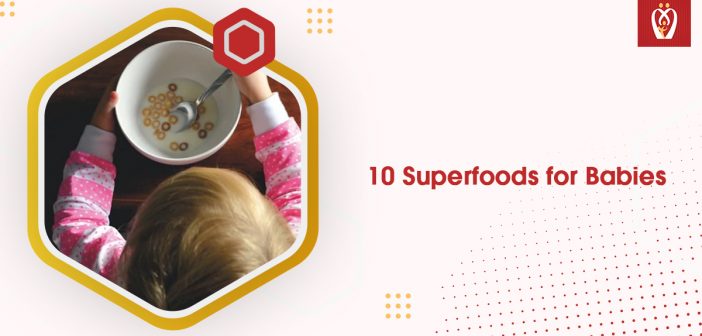You’re probably aware that some foods are better for your health than others. But, when it comes to feeding your children, the choices you make can impact their health and development. That is why so many parents are researching the best baby foods for their children. This Blog is all about 10 Superfoods for Babies.
The Benefits of Superfoods for Babies
A superfood is a nutrient-dense baby food that has provided significant health benefits for the body, brain, and immune system.
Antioxidants, vitamins, minerals, and fibre are abundant in some superfoods. Protein and good fats are great in other superfoods. While everyone should consume a range of nutritious meals, superfoods provide the most nutritional “bang.”
Introducing Superfoods to Your Child
It makes sense from a parenting standpoint to provide your child with a variety of baby food, many of which are fruits and vegetables. Your baby’s stomach is relatively small. That is why it is critical to provide as many nutrients as possible in their small meals. Here are some superfoods to think about including in your baby’s diet.
Cereal made with brown rice.
Brown rice is an excellent choice for a baby’s first solid superfood. Brown rice cereal can be introduced to your infant as soon as solid foods are introduced, usually between the ages of 4 and 6 months. Brown rice has 25% protein, minerals, essential fats, and a fantastic source of fibre, while paediatricians have praised white rice for years.
Greek Yoghurt
Yoghurt contains live probiotic microorganisms that help with digestion and immunity. Greek yoghurt contains two to three times the protein of conventional yoghurt, and it is also lower in sugar. Plant-based alternatives made from coconut or almonds are also available.
Avocado
One of the best baby foods is avocado. It’s high in monounsaturated fat, which is beneficial for your heart, and it’s also high in soluble fibre, vitamin E, and potassium. Avocados can be mashed or pureed for newborns. Avocado may be preferred as a finger food by toddlers, whereas avocado may be selected as a dip for raw vegetables by older siblings.
Oatmeal
Oatmeal is a whole grain with high fibre content. Furthermore, a 14 cup meal supplies about 8% of your baby’s iron requirements (6 to 12 months). During cooking, the health benefits of oatmeal are preserved. The extra iron in breastfed babies’ diets is beneficial.
Eggs
Eggs are high in protein and iron, including all nine amino acids. The additional iron supplementation benefits children over the age of six months. Choline is found in egg yolks, and some experts believe it can help your child’s memory. Eggs are cheap and simple to cook. While you can feed your infant egg yolks, you should wait until they are 9 to 10 months old to give them egg whites owing to allergy concerns.
Black Beans
Black beans are simple to mash or puree for babies or give as finger meals for older children.
Black beans are abundant in magnesium, fibre, and folate and are a good source of protein. Black beans and other legumes may also help lower cholesterol and prevent cancer in some cases. While you introduce black beans to your child’s diet when they are young, they are more likely to eat them as they grow older.
Kale
Kale provides 25% more calcium than milk by weight but 25% more bioavailable. Kale also contains a lot of vitamins A, C, K, and iron hence making it one of the best baby foods. Although the FDA recommends that infants not eat kale or other dark leafy greens like swiss chard until they are seven months old, steamed kale is easy to puree.
Blueberries
Vitamins A, E, and C and zinc, potassium, and selenium are abundant in blueberries. In addition, blueberries are high in carotenoids and flavonoids and fibre. Blueberries can be pureed for young babies, and as they start eating finger foods, they can be sliced in half (to reduce choking hazards).
Bananas
Bananas, which are often one of a baby’s first fruits, are also high on the list of baby foods. Cut ripe bananas make a delicious finger meal. Bananas are high in carbs, vitamin B6, potassium, and vitamin C, among other nutrients. You can start giving them to your kid when they are four months old or as soon as they begin to consume solid foods.
There is a plethora of other superfoods available.
Any single superfood is unlikely to make a significant difference in your child’s health on its own. However, if your youngster refuses to eat certain meals, you’ll need to come up with a reasonable substitute. To ensure that your kid has all they need to grow and thrive, provide them with a varied and balanced diet. There are other more baby foods for newborns, some of which you may already be familiar with.
Sweet potatoes are a type of potato that is used
- Carrots
- Squash, butternut
- Grain (whole)
- Broccoli
- Coconut
When you initially offer new baby foods to your infant, they may seem to detest them, but you should give it a few tries before giving up. If your infant continues to reject your offering after several attempts, you may wish to try again when your baby is older. The preferences of your infant may alter over time.




